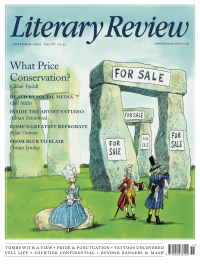George Cochrane
The Last Picture Show
Children of Paradise
By Camilla Grudova
Atlantic Books 208pp £14.99
Five years have passed since Camilla Grudova published her first book, The Doll’s Alphabet, a startling collection of stories with echoes of Angela Carter. Children of Paradise, an enjoyable satire on film culture and labour exploitation, is her debut novel. Taking its title from the classic of French cinema Les Enfants du Paradis, the novel charts the fortunes of an old cinema, the Paradise, and the young people who work there. Both are introduced through the eyes of a newcomer, Holly, who has ‘just arrived in the city, and in the country, by train, and need[s] a job’. The reader learns almost nothing more of her biography (or of the nameless city in which she settles). Her life, as far as the book is concerned, begins when she spies a ‘We’re Hiring’ sign in the window of the Paradise and goes in for an interview.
The cinema is anything but paradise. With its ‘gaudy interior’, single screen and cash tills ‘so old they looked like Victorian churches’, the venue struggles to compete with the multiplexes, and the threats of closure, takeover and redundancy are never far away. Worse still are the audiences. ‘Banana peels, strangely heavy Pepsi cups which turned out to be filled with vomit or shit, sunglasses, umbrellas and, occasionally, toenails and semen’: these are just some of the horrors Holly has to deal with when the lights go up.
Her film-snob colleagues seem to value screen relationships over real ones and initially exclude Holly from their circle. But her exclusion from the group doesn’t last long. The reason they haven’t been very welcoming, they explain, is that ‘we didn’t know how long you would be here …

Sign Up to our newsletter
Receive free articles, highlights from the archive, news, details of prizes, and much more.@Lit_Review
Follow Literary Review on Twitter
Twitter Feed
Though Jean-Michel Basquiat was a sensation in his lifetime, it was thirty years after his death that one of his pieces fetched a record price of $110.5 million.
Stephen Smith explores the artist's starry afterlife.
Stephen Smith - Paint Fast, Die Young
Stephen Smith: Paint Fast, Die Young - Jean-Michel Basquiat: The Making of an Icon by Doug Woodham
literaryreview.co.uk
15th-century news transmission was a slow business, reliant on horses and ships. As the centuries passed, though, mass newspapers and faster transport sped things up.
John Adamson examines how this evolution changed Europe.
John Adamson - Hold the Front Page
John Adamson: Hold the Front Page - The Great Exchange: Making the News in Early Modern Europe by Joad Raymond Wren
literaryreview.co.uk
"Every page of "Killing the Dead" bursts with fresh insights and deliciously gory details. And, like all the best vampires, it’ll come back to haunt you long after you think you’re done."
✍️My review of John Blair's new book for @Lit_Review
Alexander Lee - Dead Men Walking
Alexander Lee: Dead Men Walking - Killing the Dead: Vampire Epidemics from Mesopotamia to the New World by John Blair
literaryreview.co.uk